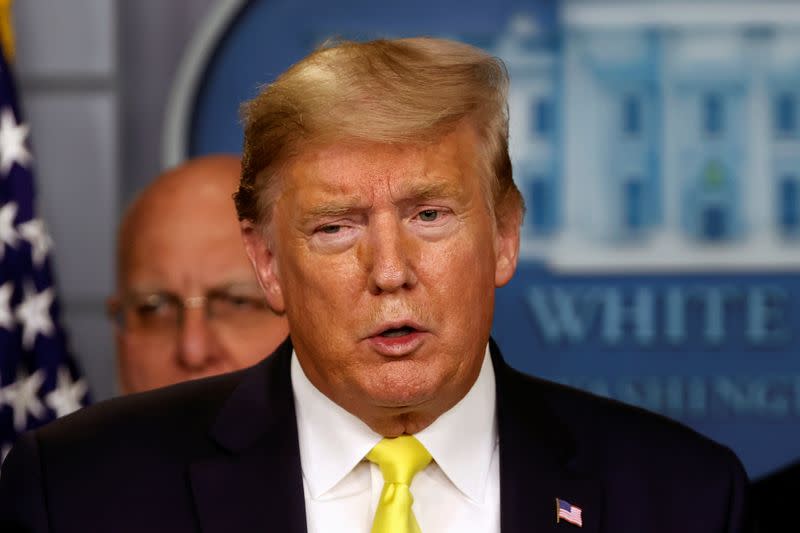Investors, analysts see market turmoil and recession as threat to Trump re-election bid
By Pete Schroeder
WASHINGTON (Reuters) - With the U.S. markets in turmoil due to coronavirus-driven recession fears and plunging oil prices, investors and analysts on Monday said they were factoring in the possibility that a blackening economic outlook could imperil President Donald Trump's re-election bid.
Wall Street on Monday suffered its biggest one-day loss since the 2008 financial crisis, and during the trading day the Dow came about a 10th of a percent from confirming a bear market -- defined by a drop of at least 20% below the most recent peak.
While Trump has repeatedly downplayed the threat posed by the flu-like virus, investors and analysts warned that the economic fallout could hurt his re-election chances in November.
"President Trump's reelection likely hinges on the economy -- a medical and/or economic shock from COVID-19 are arguably the biggest threats to his re-election," Raymond James analysts said in a note on Sunday, referring to the virus's official name.
"To preserve the economy and prevent a further market sell-off, it is in the best interest of President Trump to aggressively push for a large-scale fiscal response," they wrote.
On Monday, several investors and economists said they expected the markets to slump further, adding that the longer the slump lasted, the greater the threat it posed to Trump's bid for re-election.
"If we go into recession, history speaks for itself. No sitting president has ever been re-elected in a recession, "said Peter Cardillo, chief market economist for Spartan Capital Securities.
The selloff, which has wiped more than $4 trillion off U.S. equity markets, accelerated on Monday after Saudi Arabia and Russia began an oil price war that threatens to overwhelm global oil markets with a supply surplus. Crude prices fell 20% in their deepest daily decline since the 1991 Gulf War.
The Trump administration scrambled on Monday to assure Americans it was responding to the outbreak, rebutting criticism that it initially bungled its response and under-funded containment effort.
"The more these events affect more people, the more it's going to leave lasting impressions that can easily extend through the presidential race," said Jim Vogel, an interest rate strategist with FHN Financial. "In an event like this typically the administration has the upper hand until it attracts so much negative attention. A national crisis is a positive for an incumbent as long as things don't get out of hand."
Still, some investors said Trump may have time to recover if the outbreak is short-lived.
"If you’re President Trump fortunately for you it’s happening earlier in the year," said Chris Zaccarelli, chief investment officer at Independent Advisor Alliance, an investment adviser. "If coronavirus passes in a matter of months and the market and the economy recovers, he’ll be in as good a shape as he was coming into this year."
(Reporting by Pete Schroeder; additional reporting by Michelle Price; Editing by Leslie Adler)


